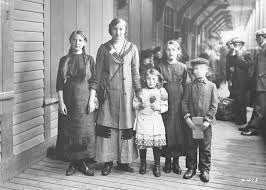
A generation ago, “The Greeneh Kuzineh” was a well-known tune among Yidden. “What is the meaning of greeneh kuzineh?” you may inquire. Does it refer to a krankeit (illness), chas vesholom? Is it some type of vegetable? A new environmental movement? Or what?
If you noticed that kuzineh sounds like cousin, you’ve hit half the nail on the head, so to speak. Now the challenge is to interpret greeneh. If you are a second- or third-generation American, you probably don’t know that the new Jewish immigrants to America were called greeneh or greenhorns – often by former greeneh! Truth be told, other than Native Americans (aka Indians), the ancestors of all the inhabitants of this country were greeneh at one time!
The song, written by Abe Schwartz, is about a young lady who arrived in the United States with high hopes. (Google it to listen to the tune.) The words, translated from the Yiddish, relate the rest of the story:
My cousin just arrived, a refugee,
Beautiful as gold was she,
With cheeks like red pomegranates
And happy feet to dance around the planet.
I arranged with a neighbor next door
A job for her since she needed the labor.
His place made clothing for the newfound gentry,
And she blessed me and her great new country.
Many years have passed for my dear cousin.
Tsures she has had here by the dozen.
Work for her has been awfully draining,
So that nothing of her youth is found remaining.
Now beneath her eyes which were so sparkling
Are lines very deep and ever-darkening.
And those pomegranate cheeks made for a dream
Have faded into a sullen gray-green.
Nowadays, when I see my dear cousin,
I ask her, “Greenhorn, how have things been buzzin’?”
She glares at me and answers sharply,
“Columbus should have burned down this whole country!”*
* * *
So it was with many immigrants who arrived to this country. They left Europe because of severe poverty and anti-Semitism. They heard that the streets of America were paved with gold. However, after arriving in this goldeneh medina (golden land), they soon realized that making a living in America was no picnic.
Such was the situation with my mother-in-law, Esther Greenspon. When discussing ahmawl (the past), she mentioned that she found employment in a sweatshop in Baltimore – and she gave a Yiddishe krechts (groan).
To better understand her krechts, I looked up “sweatshop” in Wikipedia. It defines it as a factory or workshop, especially in the clothing industry, where workers are employed at very low wages for long hours under poor conditions and many health risks. Now I understood her krechts!
An elderly Yid once told me about his arrival from the Old Country. He got a job in a factory and labored from morning until evening. The work was very difficult, and one summer he shvitzed (perspired) without letup, so he took a brief rest period. Doss hayst (that means) he stopped working for less than five minutes. “Nu,” said he, “my boss reamed me out like the owner of a resting horse. He then informed me that I would lose half a day in wages! Go argue with him. Workers had no rights.”
On a very hot day, this Yid went into a nearby pub and ordered a beer, which he drank with gusto. As he left the premises, he heard the sound of shattering glass. He noticed that it was his glass that was being tsuzetst (broken) by the bartender. He attributed it to anti-Semitism. This elderly Yiddle was an observant person, who often referred to Hashem as Der Alter (The Old One), which perhaps made him feel younger. Incidentally, his son became one of the finest surgeons in Baltimore.
* * *
Yes, bayomim hah haym (in those days), immigration to America was more difficult than it is today. There was no welfare. Immigrants attended night school to learn English. They pledged allegiance to the United States and strove to become Americanized. Most of them thought that you must belong to the Democratic Party to support democracy! Upon receiving their citizenship certificate, they proudly framed the document for all to admire.
Learning the English language was not easy. Sometimes, the vocabulary of immigrants was humorous. Take these examples: meester for mister, skrul driver for screw driver, hection for action, goyls for girls, tenk you for thank you, poyfict for perfect, poyson for person, heksent for accent, goynk for going, hepple for apple, heppy for happy, and boytday for birthday.
Ah klal (to sum up), we need to remember that the many positive things we take for granted today did not occur by chance. They were achieved because of the shvits and treren (sweat and tears) of our immigrant forefathers. So, to those forefathers who are still in this world and to those who have passed on to the Olam Ha’emes, ah groysehn dahnk (many thanks)!
* courtesy of www.lyricstranslate.com.






